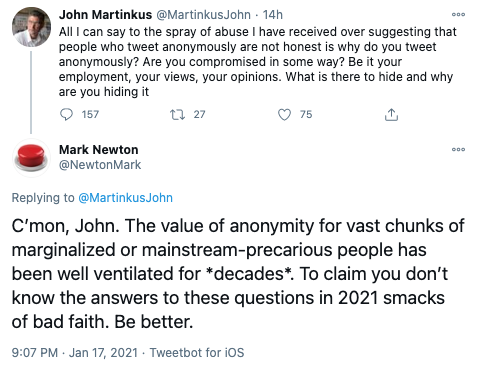So @MartinkusJohn claims he's learned some things here, which is good and admirable, and means we shouldn't see any more of this from him. /1
But it ain't just him.
Journalists were sneering at online anonymity when I owned my first modem, in the FidoNet BBS days of the late 1980s, when I was 16 years old.
None of the issues have changed since, but they've mostly become more important. /2
Journalists were sneering at online anonymity when I owned my first modem, in the FidoNet BBS days of the late 1980s, when I was 16 years old.
None of the issues have changed since, but they've mostly become more important. /2
Since the late 1980s, more and more civic discourse is conducted online. It isn't just interactions with journalists like @MartinkusJohn, it's also interactions with MPs, discussions about the costs and benefits of policies, and interactions with government agencies. /3
For example: Our public health agencies use facebook and twitter to get life-critical warnings (location alerts, etc) to the population, far more effectively than a newspaper article or the 6pm news. /4
We've just come out of a year when #robodebt was eviscerated by the courts. The only reason that was even an *issue* is because of online discourse, mostly led by marginalized people, with the aid of marginalized peoples' stories. /5
At the same time, the stakes of having an online public profile have been raised. /6
People employed by the public service face sacking or criminal prosecution if they express opinions which differ from the government of the day. /7
The public service career of @GrogsGamut was completely destroyed because James Massola believed his anonymity was unimportant, and outed him without his consent. /8
People employed by private companies have it even worse: Woolworths and other retailers can simply cease offering shifts to casual staff who post evidence of wage theft. No pushback, no consequence, no reason they won't do it over and over again. /9
Two years ago, a Minister of the Crown doxxed a welfare recipient and sent the Fairfax press after her to obliterate her reputation. (turns out the High Court agreed with her criticisms of #robodebt, but she'll never get her anonymity back) /10
I know literally HUNDREDS of women who post anonymously because relentless harassment is exhausting, or because they're abuse victims whose public profiles would attract violence. /11
Queer people, trans men and women, who can't be public because they haven't told friends or family, or because the reality of their existence is an employment risk, or because they fear explosive lethal violence. /12
Without anonymity, there are vast chunks of the population who would need to exclude themselves from these venues of public participation (and more). No safe spaces, no opportunity to be heard. /13
When anonymity is difficult, those with power find it easier to silence those with less power. That's the point, that's why the powerful have spent no less than 30 years synthesizing opposition to anonymity, globally. /14
The profession of journalism, which relies on anonymous sources to hold power to account, should understand the power dynamic; Except inasmuch as they're part of the apparatus of power themselves, which turns them into part of the problem! /15
In the late 1980s, almost no civic discourse was conducted online. In this third decade of the 21st century, almost all of it is conducted online. Excluding people from online participation means excluding them from civic discourse, benefiting powers who own the status quo. /16
Having a job where you're paid to express commentary without consequence is vastly different from having an existence where your opinions can cost you your livelihood or your bodily autonomy. Journalism is stupendously privileged, and its practitioners must recognize that. /17
Let 2021 be the year when we stop putting up with this nonsense. No more excuses. This has been going on for so long that we can assume journalists who attack anonymity know all the history, all the reality, and are acting in bad faith. /18
Journalists who claim not to know it are revealing themselves: They've grown up steeped in these influences, seeing the arguments time and time again, watching countless people be publicly destroyed by lack of access to anonymity, and they tell us they've learned nothing. /19
No more. Anonymity is valid and must be protected. Journalists who don't understand it and protect it are self-evidently unqualified to do their job, and must be treated as such.
@MartinkusJohn now understands this. If he can work it out, so can 100% of his colleagues. /end
@MartinkusJohn now understands this. If he can work it out, so can 100% of his colleagues. /end

 Read on Twitter
Read on Twitter


